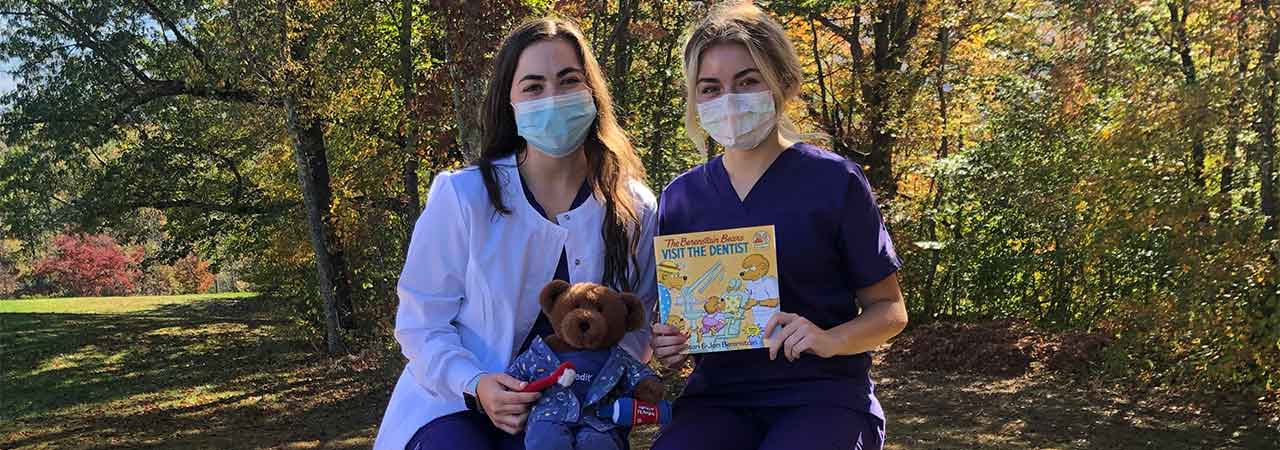New dental assisting program finds first-year success

Dental assistant program director Dr. Bowen reflects on new program’s accomplishments in 2020, despite pandemic challenges
Going into spring 2020, Emily Kate Bowen, CDA, D.D.S., of Appalachia, Virginia, had recently reached two big career milestones. Dr. Bowen earned DANB Certified Dental Assistant (CDA) certification in December 2019, plus had an instrumental role in launching the dental assistant program at Mountain Empire Community College (MECC) in January 2020.
“My decision to earn DANB certification went hand-in-hand with preparing to launch the program,” explains Dr. Bowen, who since 2017 had worked as an adjunct biology faculty member at the college before taking on her new position a year ago. “Although I had a background in dentistry, and I had experience in assisting before I attended dental school at Virginia Commonwealth University School of Dentistry, the college administration and I felt that it would be worthwhile that I seek DANB certification.”
Dr. Bowen recognizes all the benefits that certification can bring to a dental professional’s career. “There’s a lot of value in holding DANB certification in order to stay current in your profession,” she elaborates. “Certification helps me to be up-to-date about what I should know, as well as what my students should know and the resources available to them.”
Dr. Bowen’s students take the three exams that make up DANB’s National Entry Level Dental Assistant (NELDA) certification. Dr. Bowen believes holding NELDA certification is important for students to demonstrate their knowledge and sets them apart when they enter the profession. “I hope that moving forward, students will be motivated to earn more DANB credentials,” she says.
Continuing to elevate education through volunteerism
Besides encouraging students to pursue DANB certification and use DALE Foundation review courses and practice tests to help them prepare for DANB exams, Dr. Bowen also strives to connect them to volunteer opportunities. Through volunteerism, both the students and the community benefit, she believes. “There’s a tremendous need for oral healthcare in our area,” she explains. “We’ve made a lot of strides, but access to care is still a big issue.”
Over the past year, Dr. Bowen and her students have had to reimagine how to continue volunteering with social-distancing considerations in mind. “It’s been important to me and our college to continue emphasizing connecting with the community,” says Dr. Bowen, herself a volunteer, including with the University of Virginia’s (UVA) Cancer Center Without Walls.
For example, Dr. Bowen and her students had hoped to replicate a successful toothbrush-distribution “Trunk-or-Treat” event held in October 2019 at the Center for Workforce and Innovation of Appalachia, which drew about 400 elementary school students.
“We simply could not host a Halloween event in 2020 of that size. That was out of the question due to COVID-19 exposure concerns,” Dr. Bowen reflects. “So, I talked to a teacher at a local elementary school, and we decided that instead, Halloween treat bags would be given to each first-grader.” These bags included candy, a toothbrush and plaque-disclosing tablets. Dental assisting students also recorded videos of themselves reading dental-related children’s books, which were also shared with the students.
Similarly, while the college’s annual human papillomavirus (HPV) awareness event was held in person pre-pandemic, during the first week of March 2020, this year’s event took a virtual approach. Recently, about 40 to 50 students and community members attended a movie screening of “Someone You Love,” sponsored by Virginia’s HPV Immunization Taskforce and UVA’s Cancer Center Without Walls.
“If we can increase patient literacy, some of the oral health problems we typically see can be prevented. The more people know, the more they can improve their own personal health,” Dr. Bowen says. “Our goal is to expand education.”
Positioning the program for success now and in the future
Dr. Bowen is proud to look back on 2020 and see success, despite the challenges raised by the COVID-19 pandemic last spring. Like so many dental assisting educators, Dr. Bowen led the program’s effort to pivot to online learning in spring 2020. The program has since adopted a hybrid model, with lectures online, two on-campus lab days and, in the near future, clinicals one day per week.
The bottom line for Dr. Bowen is to continue expanding education, no matter the circumstances. And thanks to Dr. Bowen’s efforts, as well as the college’s ongoing teamwork, the future is bright for the MECC’s new dental assistant program and its students.
“There are always growing pains with any new program, but starting in the middle of a pandemic and balancing the hybrid-remote learning have been especially difficult,” Dr. Bowen acknowledges.
“I’d like to extend a huge shoutout to our MECC's adjunct faculty members and to students for their resilience. We couldn’t have done this without them.”

